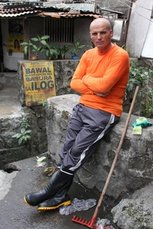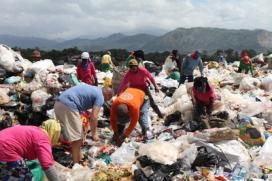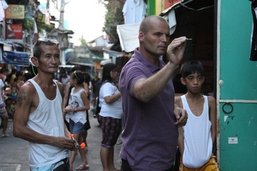 A new documentary series following Irish workers as they try to do their jobs in some of the world's most demanding locations begins with Dublin City Council street cleaner Mark Crosbie heading to Manila, the capital of the Philippines.
A new documentary series following Irish workers as they try to do their jobs in some of the world's most demanding locations begins with Dublin City Council street cleaner Mark Crosbie heading to Manila, the capital of the Philippines.
Mark had just returned from a family trip to Florida earlier this year when he got the call to join a TV documentary crew in the Philippines. At first he thought it was a practical joke by some of his friends in Dublin City Council’s cleansing department. What followed was a life changing experience as Mark found out what it’s really like to work in the world’s toughest place to be a street sweeper.
“I thought it was a wind-up” he explained. “I got a call from work. They said ‘we’re thinking of flying you over to Bangladesh for a job’. I thought it was a like a prank call from Gareth O’Callaghan on the radio.”
But it wasn’t a prank call. A TV production company were looking for someone with Mark’s background to go and spend some time with a family in Manila to find out what it’s like to work there as a ‘palero’ or street cleaner.
“A friend of mine Thomas Daly, also a member of IMPACT, had put my name forward without me knowing anything about it. I thought it would just be like my own job. They asked me if I’d be up for hard, physical work and I said yes, no problem,” he explained.
The TV show, World’s Toughest Place To Be A...originated at the BBC and features workers take on their own line of work in poorer countries, such as bin collecting in Jakarta, trawler fishing in Sierra Leone, and driving a bus in Manila.
Mel & Merly
 After receiving his inoculation shots for diphtheria and yellow fever, Mark travelled for 36 hours with the TV crew. After a night’s rest at a hotel, Mark was placed in a family home in one of Manila’s working class districts, Botocan in Quezon City (QC).
After receiving his inoculation shots for diphtheria and yellow fever, Mark travelled for 36 hours with the TV crew. After a night’s rest at a hotel, Mark was placed in a family home in one of Manila’s working class districts, Botocan in Quezon City (QC).
QC is the most populous city in the Philippines and the most populated local government unit in the country. Daily temperatures regularly exceed 30 degrees and humidity of 70%.
“I lived with a family of eight. Mel, his wife Merly and their six kids. Mel works for the local authority, for a salary of €60 a month. Their home was very basic, built with concrete blocks and a corrugated iron roof. The main room was about nine feet long and seven feet wide, with a ladder that led to a similar sized room above that.
“The daily routine involved going out with the paleros and the film crew. Mel’s shift would start at 6am and he works until 12, six days a week. The idea was that he would show me his route and all the various jobs he has to do each day, then I would take over his shift for a day to give him a day off.
“Some of the streets are just a couple of feet wide, with market stalls and scooters all around you. We worked with a handcart that weighed like a Sherman tank,” he says.
Valued
Mark was struck by the attitude of the local population toward the paleros. “They really respect them, the six paleros in the Botocan district are valued members of their communities because they keep the place clean.
“Mel also deals with sewage waste, the sewers are open, like a stream, and waste drops directly from the houses into this stream. It can get blocked up so he has to rake it out at different locations to keep it flowing, sometimes the water level is higher than his boots so the water and waste gets in,” he explains.
“I was willing to do the same work with the same equipment the lads use, to show I was up for the challenge. But the TV crew had bought me a proper set of waders for safety, so at the end of the shoot we gave our boots and waders to the local palero crew.”
Mark also donated all of his clothes and travelling expenses to his hosts, Mel and Merly.
“The people I met have nothing, no luxuries, none of the things we’d take for granted, but they are so welcoming, they took such good care of me. They seemed genuinely glad to have me there.
Smoky Mountain
 IMPACT’s Central Executive Committee (CEC) has approved a donation from IMPACT’s Global Solidarity Fund for one of the projects that Mark visited in Manila. KNK operates Alternative Learning System (ALS) activities in Payatasu or "Smoky" Mountain District, which is known for child labour in landfill heaps.
IMPACT’s Central Executive Committee (CEC) has approved a donation from IMPACT’s Global Solidarity Fund for one of the projects that Mark visited in Manila. KNK operates Alternative Learning System (ALS) activities in Payatasu or "Smoky" Mountain District, which is known for child labour in landfill heaps.
KNK Children Centre offers educational opportunities to children in these locations who can't go to school, and educational programs that foster leadership and cooperation through volunteer activities.
Mark is also organising a fundraising event later in the year for the Smoky Mountain project. Details of the fundraiser will be included in a future IMPACT ebulletin.
This is a summarised version of Mark’s story which appears in the latest edition of Work & Life magazine, which is begins circulating in your workplace from next week.